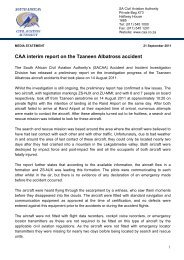FLIGHT INSTRUCTOR GUIDE Aeroplane - South African Civil ...
FLIGHT INSTRUCTOR GUIDE Aeroplane - South African Civil ...
FLIGHT INSTRUCTOR GUIDE Aeroplane - South African Civil ...
Create successful ePaper yourself
Turn your PDF publications into a flip-book with our unique Google optimized e-Paper software.
DEVELOPMENTAL TEACHING<br />
OR TEACHING BY QUESTIONING<br />
1. Developmental teaching is based upon a student centred philosophy of teaching which<br />
requires you to reason with students to have them meet predetermined objectives. Using<br />
students' background knowledge, you ask questions which lead students to determine the next<br />
step in a procedure, the logical application of a principle, or the final solution to a problem. The<br />
rate of progress in developing the more complex ideas of the lesson is governed by the<br />
students' perception and comprehension. Questions should be asked to review previously<br />
learned material. The process of developmental teaching begins when students are required to<br />
reason out and make suggestions with respect to new material.<br />
2. Developmental teaching has been used throughout the years by all good teachers.<br />
Because of the requirement for every student to participate, developmental teaching is effective<br />
with small groups and with individual students. It can be used at any level of student knowledge<br />
provided you know or determine the appropriate level and proceed accordingly. Depending<br />
upon the subject matter, some lessons can be entirely "developmental". More frequently,<br />
however, there will be a combination of teaching by explanation, where it may be more efficient<br />
to explain certain material, and developmental teaching where crucial areas of the subject<br />
matter can be reasoned with your students. In almost every lesson, some developmental<br />
teaching is appropriate and desirable.<br />
3. The main advantage of developmental teaching is that it promotes efficient student<br />
learning because it satisfies all the basic aspects of learning. Since students participate in<br />
meaningful activity, they are forced to think about the material being learned, as questions are<br />
answered verbally. Consequently, interest is maintained, a sense of accomplishment is gained<br />
and effective learning takes place. You receive constant feedback and frequent confirmation of<br />
a student's progress.<br />
4. Careful planning for developmental teaching is critical because you must formulate<br />
appropriate questions which demand reasoning on the part of your students. The standard<br />
questioning techniques must be observed, and student responses must be handled with tact<br />
and discretion. In addition to being a master of the subject material, you must be flexible in your<br />
approach. You must permit adequate discussion, yet exercise sufficient control to move<br />
towards the lesson objectives. Frequent summaries are necessary to consolidate the material<br />
as the lesson progresses.<br />
5. Novice instructors are frequently apprehensive about trying developmental teaching.<br />
Experience has shown that students consistently surprise instructors if given the chance to<br />
participate actively in the learning process. The disadvantage of lecturing during preparatory<br />
instruction is that students are frequently told material that they already know, or that they<br />
reasonably can be expected to deduce on their own. The best teaching occurs when students<br />
are led to a point from which they can systematically direct their own reasoning to the solution of<br />
a problem. The secret of effective learning is to keep students mentally active in the learning<br />
process. With developmental teaching students are forced to think.<br />
29













